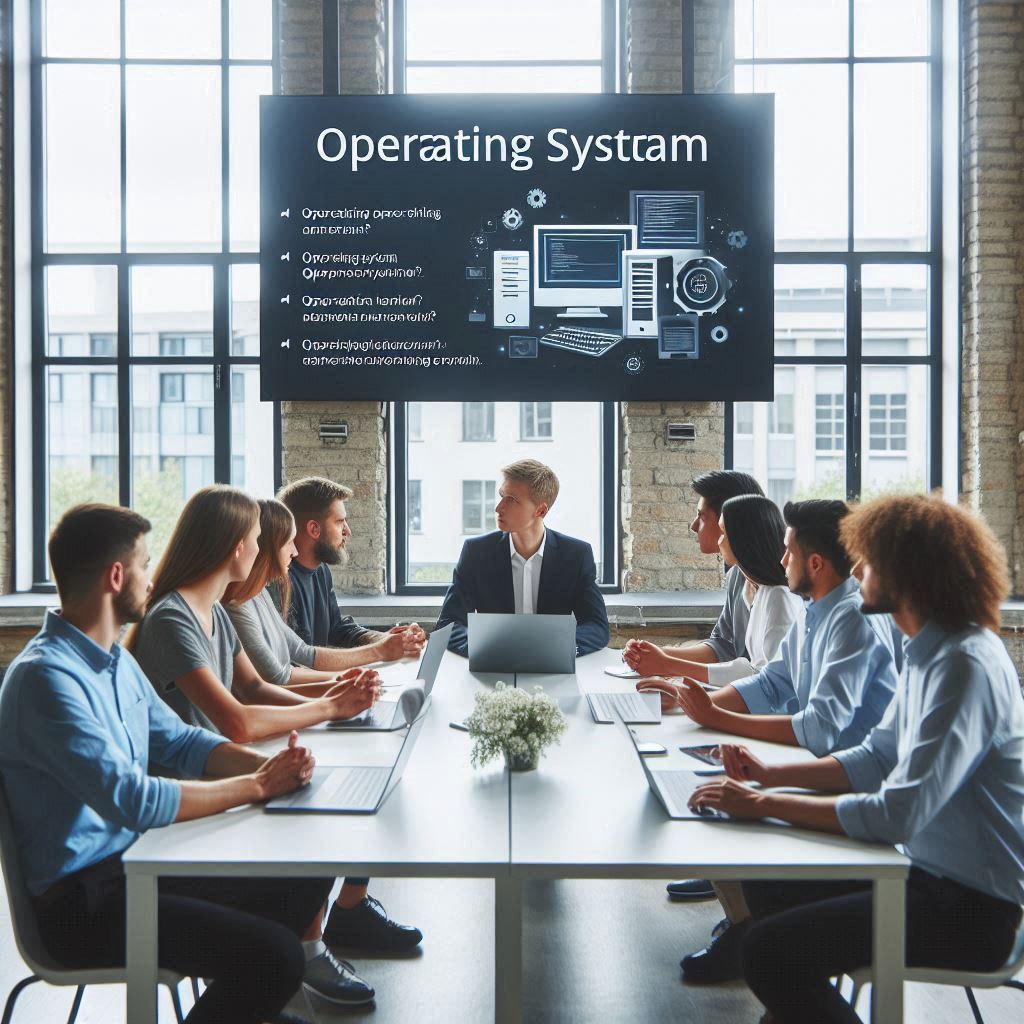
Top Operating System Interview Questions and Answers (2025 Edition)
Introduction
Picture your computer as a bustling city: the operating system (OS) is the mayor, traffic cop, and city planner rolled into one. operating system interview questions keeps everything—hardware, apps, and users—running smoothly. Whether you’re a newbie coder or a grizzled systems engineer, nailing OS concepts is your ticket to shining in tech interviews. I’ve been through the interview grind myself, and I’m sharing the top OS questions you’ll face in 2025, with answers that are clear, practical, and peppered with real-world insights.
Table of Contents
-
What’s an Operating System, Anyway?
-
Why OS Questions Are a Big Deal
-
Beginner-Friendly OS Questions
-
Intermediate OS Challenges
-
Advanced OS Brain-Teasers
-
Real-World Scenarios
-
Pro Tips to Ace OS Interviews
-
Resources to Level Up
-
Wrapping Up
-
FAQs
What’s an Operating System, Anyway?
An OS is just like the conductor of a tech orchestra, ensuring each device—CPU, reminiscence, storage, and apps—performs in concord
. operating system interview questions translates your clicks and commands into actions the hardware understands, all while juggling resources so nothing crashes.
Examples I’ve Worked With:
-
Windows 11: My go-to for gaming and coding.
-
Ubuntu 24.04: Perfect for server tinkering.
-
Android 15: Powers my phone’s slick multitasking.
-
Free RTOS: Used in a drone project I built for fun.
2. Why OS Questions Are a Big Deal
OS knowledge is your tech street cred. Interviewers love it because it shows you get how computers tick at their core. Plus, operating system interview questions critical for:
-
Debugging: Spotting why an app hogs memory.
-
Optimization: Making systems faster, like tuning a race car.
-
Innovation: Building cool stuff, from cloud platforms to self-driving cars.
Hot in 2025:
-
Cloud/DevOps: Think Kubernetes and AWS.
-
AI Systems: OS tweaks for machine learning workloads.
-
Cybersecurity: Locking down kernels against hackers.
I once bombed an interview by blanking on virtual memory—lesson learned: OS basics are non-negotiable!
3. Beginner-Friendly OS Questions
Q1: What does an OS actually do?
Answer: operating system interview questions the ultimate multitasker, handling:
-
Processes: Starting and stopping apps, like a stage manager for a play.
-
Memory: Divvying up RAM so apps don’t fight.
-
Files: Organizing your data, like a librarian.
-
Devices: Talking to printers, GPUs, and more.
-
Security: Keeping the bad guys out.
-
Interface: Giving you a sleek desktop or command line.
My Take: When I built a Raspberry Pi media server, the OS (Raspbian) was the glue that made my Python scripts talk to the hard drive.
Q2: Process vs. Thread—what’s the difference?
Answer: Think of a process as a food truck with operating system interview questions own kitchen (memory). A thread is a chef inside that truck, sharing the kitchen but cooking something different.
|
Aspect |
Process |
Thread |
|---|---|---|
|
What operating system interview questions Is |
Solo operation with own space |
Team player in same space |
|
Memory |
Private pantry |
Shared pantry |
|
Speed |
Slower to start (new truck) |
Quick to spin up (new chef) |
|
Example |
Spotify vs. Chrome |
Chrome tabs |
Anecdote: I once debugged a Python app where threads saved the day by speeding up data processing without eating up RAM.
Q3: What kinds of OSes are out there?
Answer:
-
Batch: Old-school, like a factory line processing payroll (e.g., IBM’s early systems).
-
Time-sharing: Lets multiple users share the CPU, like a busy coffee shop (e.g., Linux servers).
-
Distributed: Teams up computers, like a band jamming remotely (e.g., Hadoop clusters).
-
Real-time: Super precise for critical tasks, like a heart monitor (e.g., QNX in cars).
-
Network: Runs shared services, like a community center (e.g., Windows Server).
2025 Twist: Real-time OSes are huge in autonomous drones—I saw one demo at a tech meetup that blew my mind.
Q4: What’s multitasking?
Answer: operating system interview questions the OS playing juggler, running multiple apps at once by quickly switching between them. Think of flipping between Netflix and Slack without a hitch.
-
Preemptive: The OS decides who’s up next (modern, like Linux).
-
Cooperative: Apps choose when to pause (old-school, like Windows 3.1).
My Experience: Multitasking saved my sanity when I ran a game server and a chatbot on the same PC.
4. Intermediate OS Challenges
Q5: What’s context switching?
Answer: operating system interview questions like a DJ swapping tracks mid-party. The OS pauses one process, saves operating system interview questions state (like where the needle is), and starts another. operating system interview questions key for multitasking but slows things down if overdone.
Example: When I streamed a game while coding, the OS was context-switching like crazy to keep both smooth.
Q6: What are system calls?
Answer: They’re like ordering takeout from the OS kitchen. Apps ask the kernel for stuff like opening files or creating processes via special commands (e.g., fork() to spawn a process, read() to grab file data).
My Project: I used mmap() in a C program to map a huge dataset into memory—super fast but tricky to debug!
Q7: What are the stages of a process’s life?
Answer: Imagine a process as a student:
-
New: Enrolling in class.
-
Ready: Waiting for a desk (CPU).
-
Running: Doing homework (executing).
-
Waiting: Taking a break for lunch (I/O).
-
Terminated: Graduating or dropping out.
Tip: Draw this as a cycle in interviews—operating system interview questions a hit with interviewers.
Q8: What’s a deadlock?
Answer: operating system interview questions a standoff where processes are like stubborn drivers at a four-way stop, each holding a lane (resource) and waiting for another to move. For a deadlock, you need:
-
Exclusive Locks: Only one process can hold a resource.
-
Holding Tight: Processes won’t let go while waiting.
-
No Forcing: Can’t steal resources.
-
Circular Jam: Everyone’s waiting in a loop.
My Fix: In a group project, we avoided deadlocks by always locking database tables in the same order.
Q9: What’s virtual memory?
Answer: operating system interview questions like a magic notebook that lets apps pretend they have endless paper (memory) by borrowing space from the hard drive. Each app gets operating system interview questions own “notebook” for privacy.
Real-World: My laptop with 8GB RAM runs 20 Chrome tabs thanks to virtual memory, though it gets sluggish when swapping to disk.

5. Advanced OS Brain-Teasers
Q10: Paging vs. Segmentation—break it down.
Answer:
-
Paging: Chops memory into equal chunks (pages), like cutting a cake into squares. Easy to manage but less flexible.
-
Segmentation: Divides memory by purpose (e.g., code, data), like slicing a pizza by toppings. More intuitive but messier.
|
Feature |
Paging |
Segmentation |
|---|---|---|
|
Size |
Fixed chunks |
Varies by segment |
|
Use |
Modern OS (Linux, Windows) |
Older systems (Multics) |
|
Pros |
No gaps, simple |
Logical organization |
2025 Note: Paging rules today, but I saw segmentation in a retro OS project I explored on GitHub.
Q11: User Mode vs. Kernel Mode?
Answer:
-
User Mode: Apps live here, like tenants in an apartment with limited access (no touching the wiring).
-
Kernel Mode: The OS’s playground, with full control over the building (hardware).
|
Aspect |
User Mode |
Kernel Mode |
|---|---|---|
|
Power |
Restricted |
Full control |
|
Safety |
Crashes don’t kill OS |
Crashes can take down all |
|
Example |
Your Python script |
Device drivers |
Anecdote: I once wrote a kernel module that crashed my Linux VM—kernel mode is no joke!
Q12: What’s demand paging?
Answer: operating system interview questions like loading a book chapter only when you need to read it. Pages stay on disk until an app asks for them, saving RAM but risking delays (page faults).
My Use: In a machine learning project, demand paging let me load a massive dataset bit by bit.
Q13: Semaphores vs. Mutexes?
Answer:
-
Semaphore: A counter that signals how many can enter (e.g., 3 seats left in a café).
-
Mutex: A single-key lock for one user at a time (e.g., one person in a bathroom).
|
Feature |
Semaphore |
Mutex |
|---|---|---|
|
Type |
Counting or binary |
Binary only |
|
Use |
Manage resource pools |
Guard critical sections |
|
Example |
Limiting API calls |
Protecting a log file |
2025 Trend: Semaphores are big in distributed systems like Redis queues I’ve worked with.
Q14: What’s a race condition?
Answer: operating system interview questions when threads trip over each other trying to update shared data, like two chefs grabbing the same ingredient and messing up the recipe. The outcome depends on who’s faster.
My Bug: I had a race condition in a Node.js app where two threads mangled a counter—fixed it with a mutex.
6. Real-World Scenarios
Q15: How do you prevent deadlocks in a banking app?
Answer:
-
Sort Resources: Always lock accounts by ID order (e.g., lowest ID first).
-
Timeouts: Drop locks if waiting too long.
-
All-or-Nothing: Grab all needed locks at once or retry.
-
Monitor: Use tools to spot and break deadlocks.
My Story: In a fintech internship, we used timeouts to keep transactions from freezing.
Q16: How does Linux schedule processes?
Answer: Linux uses the Completely Fair Scheduler (CFS), like a fair teacher giving every student equal time. It tracks tasks in a red-black tree, prioritizing those who’ve waited longest.
Cool Fact: I tweaked CFS settings in a cloud server to boost performance for a web app.
Q17: How do containers like Docker work with the OS?
Answer: Containers are like lightweight apartments in a building (the OS). They share the kernel but use:
-
Namespaces: Walls to isolate processes, networks, etc.
-
Cgroups: Limits on CPU and memory.
-
UnionFS: Layered storage for efficiency.
My Experiment: I ran a Flask app in Docker, and namespaces kept it from messing with my host system.
7. Pro Tips to Ace OS Interviews
-
Get the Why: Don’t just memorize—understand why virtual memory saves RAM or why CFS is fair.
-
Sketch It Out: Draw process states or page tables on a whiteboard. I practiced this with a friend and it wowed my interviewer.
-
Code It: Write a toy scheduler in Python or C. I built one for fun, and it helped me nail a scheduling question.
-
Read Real Code: Peek at Linux kernel’s scheduler on GitHub. operating system interview questions intimidating but enlightening.
-
Mock It Up: Do mock interviews on Interviewing.io. I flubbed my first one but aced the real deal after practice.
-
Stay Current: Check out eBPF for system monitoring—operating system interview questions hot in 2025 DevOps.
8. Resources to Level Up
|
Type |
Pick |
Why It Rocks |
|---|---|---|
|
Book |
Modern Operating Systems (Tanenbaum) |
Deep but readable, with real examples. |
|
Course |
Nand2Tetris (Coursera) |
Builds an OS from scratch—mind-blowing! |
|
Repo |
xv6 (MIT’s teaching OS) |
Simple OS code you can actually read. |
|
Practice |
LeetCode OS problems, HackerRank |
Sharpens your skills with timed tests. |
|
Docs |
Linux Kernel Archives (kernel.org) |
The real deal for system call details. |
My Find: I stumbled on xv6 while geeking out on GitHub, and it made paging crystal clear.
9. Wrapping Up
Operating systems are the unsung heroes of tech, and mastering them sets you apart in interviews. From juggling processes to dodging deadlocks, this guide has you covered with questions, answers, and stories from my own tech journey. Whether you’re aiming for a FAANG gig or a startup role, dive into these concepts, code a little, and you’ll be ready to impress.
10. FAQs
Q1: What OS topics are must-knows for 2025?
-
Processes and threads
-
Memory tricks (paging, virtual memory)
-
Locking (mutexes, semaphores)
-
Deadlocks
-
Containers and system calls
Q2: Do I need to know Linux?
-
operating system interview questions a bonus, not a must. But knowing Linux (like strace or CFS) makes you look like a rockstar, especially for DevOps or systems roles.
Q3: How do I practice OS coding?
-
Code a simple scheduler (I did one in Python).
-
Simulate paging in C.
-
Play with threads and locks in a small app.
Q4: How long to prep?
-
Newbies: 3–4 weeks, 2 hours a day.
-
Pros: 1–2 weeks to refresh and practice.
Q5: What’s new in OS for 2025?
-
eBPF: For tracking system performance.
-
WASM: App isolation without heavy VMs.
-
AI Scheduling: Optimizing CPUs for neural nets.


